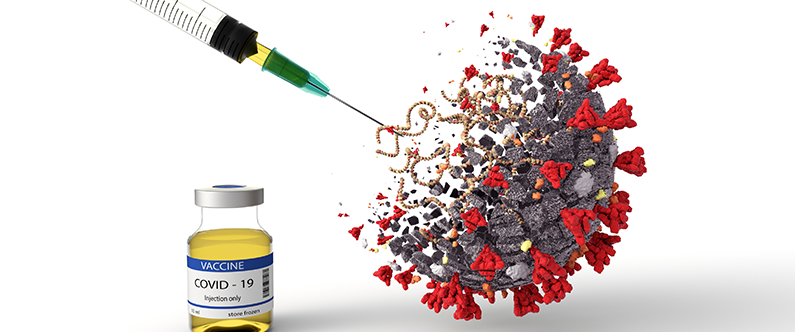COVID-19 & Breakthrough Infection: What You Need to Know
 Cases of vaccinated people testing positive for SARS-CoV-2 or developing COVID-19 symptoms have been reported - these phenomena are referred to as ‘breakthrough infection’ or ‘breakthrough disease’
Cases of vaccinated people testing positive for SARS-CoV-2 or developing COVID-19 symptoms have been reported - these phenomena are referred to as ‘breakthrough infection’ or ‘breakthrough disease’
With high COVID-19 vaccination uptake among the eligible population in Qatar recently, the number of new COVID-19 cases has fallen in the country. However, there have been media reports both locally and overseas about vaccinated people testing positive for SARS-CoV-2 or developing COVID-19 symptoms. These phenomena are referred to as ‘breakthrough infection’ or ‘breakthrough disease’ respectively and have raised concern about vaccine effectiveness.
Breakthrough infection and breakthrough disease
When a person who is fully vaccinated against COVID-19 tests positive using a laboratory test (such as the COVID-19 PCR test or the antigen test), but shows no signs or symptoms of COVID-19 (i.e., they are asymptomatic), this is referred to as a COVID-19 breakthrough infection. Whereas when a person fully vaccinated against COVID-19 experiences COVID-19 symptoms and is confirmed with a positive COVID-19 PCR or antigen test, this is referred to as a breakthrough disease.
Causes of COVID-19 breakthrough infection or disease
The COVID-19 vaccines available in Qatar are highly effective, but no vaccine can be 100 percent protective for every person who has been vaccinated. Consequently, a small proportion of people who have been fully vaccinated can get COVID-19. Further, the COVID-19 vaccines were designed for the original variant of the SARS-CoV-2 virus, and the newer strains such as the Delta variant may be able to escape detection by the body more easily. This could reduce vaccine effectiveness, though the drop in effectiveness is likely marginal.
Vaccines and COVID-19 breakthrough infection or disease
Most COVID-19 breakthrough infection results in either no symptoms or only mild symptoms. The COVID-19 vaccines are incredibly effective and even if they fail to prevent disease 100 percent of the time, they:
- Reduce the severity of COVID-19 (i.e., one is more likely to suffer a milder form of the disease).
- Reduce the need for hospitalization and the risk of dying from COVID-19.
In addition, vaccines also reduce disease transmission. If a vaccinated person suffers from breakthrough infection or disease, they shed fewer virus particles for a shorter period of time than someone who is unvaccinated. This means that a person with a breakthrough infection or disease is less likely to spread COVID-19 than someone who is not vaccinated and has COVID-19. However, this data may not fully consider the Delta variant of SARS-CoV-2. New studies suggest that the delta variant may result in more frequent breakthrough infection and disease as compared to the original variant of COVID-19 – research is still ongoing.
People vulnerable to breakthrough infection or disease

People who are more susceptible to breakthrough infection or disease include:
- Older persons
- Persons with weaker immune systems (such as those who have chronic illness such as cancer, diabetes, or high blood pressure)
Minimizing the risk of breakthrough infection or disease
The risk of breakthrough infection or disease is correlated to how often and how long a vaccinated individual is exposed to the SARS-CoV-2 virus. It is thus important to not become complacent and to continue to follow preventive measures as recommended by Qatar’s Ministry of Public Health, including wearing facemasks, physical distancing, appropriate hand hygiene, and avoiding crowded places (especially indoors). This will help ensure that everyone in our community is kept safe from COVID-19 disease.
Sources: World Health Organization (WHO): Science in 5 | Centers for Disease Control and Prevention (CDC): Breakthrough Infections | Johns Hopkins Bloomberg School of Public Health: Data on COVID-19 Transmission by Vaccinated Individuals
Authors: Dr. Amit Abraham, Dr. Karima Chaabna, and Dr. Sohaila Cheema
Editing: Mr. John Hayward